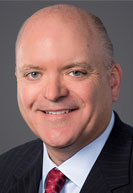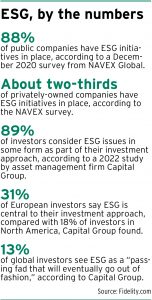Subscriber Benefit
As a subscriber you can listen to articles at work, in the car, or while you work out. Subscribe NowProposed legislation in the Indiana Legislature has put a spotlight on two schools of thought when it comes to investing public pension funds.

One bill out of a handful of similar pieces of legislation is Senate Bill 292, introduced by Sen. Travis Holdman, R- Markle, who described the legislation as codifying public pension investment principles that focus on bringing the highest rate of return.
Holdman said doesn’t believe ESG — the hot-button acronym for environmental, social and governance — factors should be used to govern the investment of public funds.
“That can’t be the decision-making authority that decides if we invest in a company or not,” the senator said.
But Democratic politicians are advocating in favor of ESG investment strategies.
Forbes defines ESG strategy as investing in companies that score highly on environmental and societal responsibility scales, as determined by third parties.
The pending Indiana legislation defines what actions would count as ESG investing, like investor leeriness of specific protected industries such as firearms, fossil fuels and more. The bills would require the Indiana Public Retirement System and the Indiana State Police Pension Trust to divest from offending funds or cut ties with erring financial managers.
Political influence
Charles Baldwin, a shareholder in Ogletree Deakins’ Indianapolis office and a leader of the firm’s Environmental, Social and Governance Practice Group, said the concept of “environmental, social and governance” investment is relatively new.

 Still, from an employer’s perspective, similar issues have been out there for a while, Baldwin said. For some investors, he said, human capital is important to consider in making investment decisions.
Still, from an employer’s perspective, similar issues have been out there for a while, Baldwin said. For some investors, he said, human capital is important to consider in making investment decisions.
Politics can get in the middle of ESG investing decisions, Baldwin continued, with some investment funds practicing ESG principles and others steering away from them and focusing solely on getting the highest returns possible.
That political backdrop is present at both the state and national levels.
In Indiana, Holdman’s SB 292 passed the Senate in February and has been referred to the House Financial Institutions Committee, which has not yet scheduled a hearing for the bill.
On the House side, House Bill 1008 — the ESG investing bill getting the most attention in Indiana — passed the House along mostly party lines in late February, with Democrats united in opposition.
HB 1008, authored by Rep. Ethan Manning, R-Logansport, has been referred to the Senate Committee on Pensions and Labor, which also has not scheduled a hearing on the bill.
The concepts of SB 292 and HB 1008 are essentially the same: requiring fiduciaries of public pension funds to act “solely in the financial interest of the participants and beneficiaries of the public pension system.” In other words, ESG investing would not be allowed for the Indiana Public Retirement System or Indiana State Police Pension Trust.
Indiana’s potential move to restrict ESG investing of its roughly $45 billion in pension funds comes as President Joe Biden is taking a decidedly different tack.
In the first veto of his presidency, Biden on March 20 sought to kill a Republican measure that bans the government from considering environmental impacts or potential lawsuits when making investment decisions for Americans’ retirement plans, according to The Associated Press.
The measure vetoed by Biden ended a Trump-era ban on federal managers of retirement plans considering factors such as climate change, social impacts or pending lawsuits when making investment choices, the AP reported. Because suits and climate change have financial repercussions, Biden administration officials argue that the investment limits are courting possible disaster.
As at the state level, federal ESG critics say such investments allocate money based on political agendas, such as a drive against climate change, rather than on earning the best returns for savers.
But Biden, in a video released by the White House, said he vetoed the measure because it “put at risk the retirement savings of individuals across the country,” according to the AP.
In practice

Walé Oriola, counsel at Faegre Drinker Biddle & Reath LLP and one of the firm’s ESG leaders, said he’s seen a good number of investment managers make changes to their policies and integrate ESG-related factors into their decision-making processes.
Oriola said there is a school of thought that risks associated with climate change, social factors and good governance matter to value creation for investments.
“Some do see them as financial factors. They do have a materiality as far as they relate to investment decisions,” he said.
Likewise, Baldwin said Ogletree Deakins formed its ESG Practice Group on the basis of client need. He said he views HB 1008 differently than some other attorneys working in that space.
“Because it is a public pension, you don’t have any influence as a plan participant on how it’s invested,” Baldwin said.
Also, Baldwin said he sees the pending Indiana legislation as trying to look past politics and reaffirm the idea of fulfilling the state’s fidicuary duty to the pension plan participants and maximize the pension’s rate of return.
In discussing the legislation, Baldwin gave a theoretical example of a fund manager fired from Chase Bank who lands a job at an investment management firm and refused to invest clients’ money in Chase due to lingering personal resentment toward his previous employer.
 “This is reminding everyone, ‘You have a fiduciary duty; let’s not forget our goal,’” Baldwin said.
“This is reminding everyone, ‘You have a fiduciary duty; let’s not forget our goal,’” Baldwin said.
Further, Baldwin said managers of pension funds typically invest in all financial sectors and are relatively conservative, mitigating risks and diversifying investments.
“As I read it, it doesn’t say you can’t invest in ESG funds,” Baldwin said. “If an ESG fund is killing it, in terms of returns, I don’t see why you can’t invest in it.”
But Oriola said he sees HB 1008 as narrowing the pool of investment managers who can participate in investing the state’s public pension funds. He said some states like Indiana have been more far-reaching than others in terms of proposed legislation that would neutralize ESG investing.
Before he joined Faegre Drinker, Oriola worked for the U.S. Securities and Exchange Commission as senior counsel for the Division of Investment Management. In that role, he said he learned that good governance has always been a traditional factor considered by investment managers, with environmental risks surging to prominence in recent years in response to new climate change studies.
“I think having that foresight is necessary to satisfy your fiduciary duties to your clients,” Oriola said.
Potential bill impacts
Dimitri Kyser, a communications specialist for the Indiana Public Retirement System, said INPRS considered the opportunity cost of moving all investments to passive public markets within its defined benefit, or DB, and defined contribution, or DC, plans, which was estimated to be $6.7 billion over 10 years.
Kyser said that estimated value was based on the assumption that INPRS’s retirement funds continue to outperform their benchmarks from private markets and active management over the next 10 years at the same level that has been realized over the past 10 years, as compared to INPRS’s 6.25% target annual rate of return.
He said the House bill could increase the administrative costs of administering public pension funds. Specifically regarding proxy voting requirements, INPRS would be prohibited from delegating proxy voting authority to its
investment managers.
Kyser said INPRS would have to revoke external authority and vote proxies internally. That would require a proxy adviser to sign a contract directly with INPRS to become a fiduciary to the plan and provide a custom policy.
INPRS estimates an increase of administrative costs by $550,000 per year for the DB and DC plans: $200,000 for the custom policy with the proxy adviser and $350,000 for the internal staff INPRS would require to provide detailed research and direction to the proxy adviser on specific, controversial proxy votes across the globe.
“INPRS invests for the sole and exclusive benefit of its members and beneficiaries,” Kyser said in an email to Indiana Lawyer. “INPRS does not consider ESG factors, but only financial and economic factors when investing. INPRS is sympathetic to the impact that ESG is having on certain Indiana businesses and individuals. INPRS has and will continue to engage with the Indiana General Assembly on any financial impacts created by HB 1008 and work toward a solution.”
Sen. Holdman said he expects to see a public pension investment bill passed in Indiana with strong legislative support.
“I think it compels investment managers to go for the target rate and not get hung up on environmental, governance and social issues,” he said.•
Please enable JavaScript to view this content.
